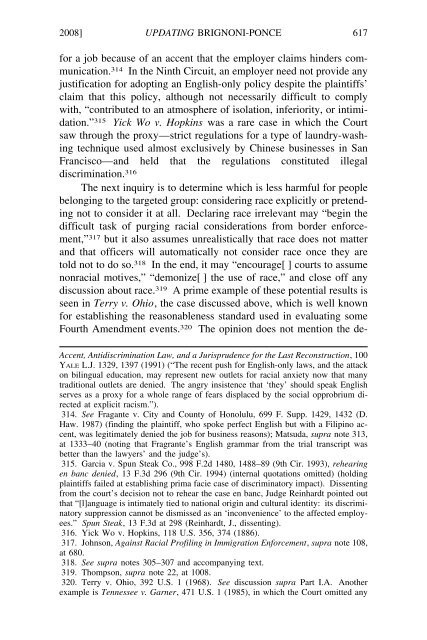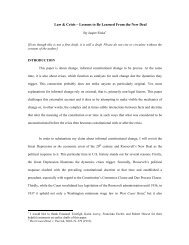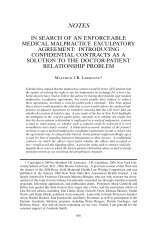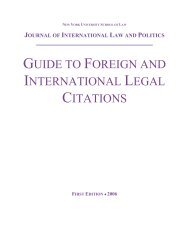updating brignoni-ponce - New York University School of Law
updating brignoni-ponce - New York University School of Law
updating brignoni-ponce - New York University School of Law
Create successful ePaper yourself
Turn your PDF publications into a flip-book with our unique Google optimized e-Paper software.
2008] UPDATING BRIGNONI-PONCE 617<br />
for a job because <strong>of</strong> an accent that the employer claims hinders communication.<br />
314 In the Ninth Circuit, an employer need not provide any<br />
justification for adopting an English-only policy despite the plaintiffs’<br />
claim that this policy, although not necessarily difficult to comply<br />
with, “contributed to an atmosphere <strong>of</strong> isolation, inferiority, or intimidation.”<br />
315 Yick Wo v. Hopkins was a rare case in which the Court<br />
saw through the proxy—strict regulations for a type <strong>of</strong> laundry-washing<br />
technique used almost exclusively by Chinese businesses in San<br />
Francisco—and held that the regulations constituted illegal<br />
discrimination. 316<br />
The next inquiry is to determine which is less harmful for people<br />
belonging to the targeted group: considering race explicitly or pretending<br />
not to consider it at all. Declaring race irrelevant may “begin the<br />
difficult task <strong>of</strong> purging racial considerations from border enforcement,”<br />
317 but it also assumes unrealistically that race does not matter<br />
and that <strong>of</strong>ficers will automatically not consider race once they are<br />
told not to do so. 318 In the end, it may “encourage[ ] courts to assume<br />
nonracial motives,” “demonize[ ] the use <strong>of</strong> race,” and close <strong>of</strong>f any<br />
discussion about race. 319 A prime example <strong>of</strong> these potential results is<br />
seen in Terry v. Ohio, the case discussed above, which is well known<br />
for establishing the reasonableness standard used in evaluating some<br />
Fourth Amendment events. 320 The opinion does not mention the de-<br />
Accent, Antidiscrimination <strong>Law</strong>, and a Jurisprudence for the Last Reconstruction, 100<br />
YALE L.J. 1329, 1397 (1991) (“The recent push for English-only laws, and the attack<br />
on bilingual education, may represent new outlets for racial anxiety now that many<br />
traditional outlets are denied. The angry insistence that ‘they’ should speak English<br />
serves as a proxy for a whole range <strong>of</strong> fears displaced by the social opprobrium directed<br />
at explicit racism.”).<br />
314. See Fragante v. City and County <strong>of</strong> Honolulu, 699 F. Supp. 1429, 1432 (D.<br />
Haw. 1987) (finding the plaintiff, who spoke perfect English but with a Filipino accent,<br />
was legitimately denied the job for business reasons); Matsuda, supra note 313, R<br />
at 1333–40 (noting that Fragrante’s English grammar from the trial transcript was<br />
better than the lawyers’ and the judge’s).<br />
315. Garcia v. Spun Steak Co., 998 F.2d 1480, 1488–89 (9th Cir. 1993), rehearing<br />
en banc denied, 13 F.3d 296 (9th Cir. 1994) (internal quotations omitted) (holding<br />
plaintiffs failed at establishing prima facie case <strong>of</strong> discriminatory impact). Dissenting<br />
from the court’s decision not to rehear the case en banc, Judge Reinhardt pointed out<br />
that “[l]anguage is intimately tied to national origin and cultural identity: its discriminatory<br />
suppression cannot be dismissed as an ‘inconvenience’ to the affected employees.”<br />
Spun Steak, 13 F.3d at 298 (Reinhardt, J., dissenting).<br />
316. Yick Wo v. Hopkins, 118 U.S. 356, 374 (1886).<br />
317. Johnson, Against Racial Pr<strong>of</strong>iling in Immigration Enforcement, supra note 108, R<br />
at 680.<br />
318. See supra notes 305–307 and accompanying text. R<br />
319. Thompson, supra note 22, at 1008. R<br />
320. Terry v. Ohio, 392 U.S. 1 (1968). See discussion supra Part I.A. Another<br />
example is Tennessee v. Garner, 471 U.S. 1 (1985), in which the Court omitted any
















